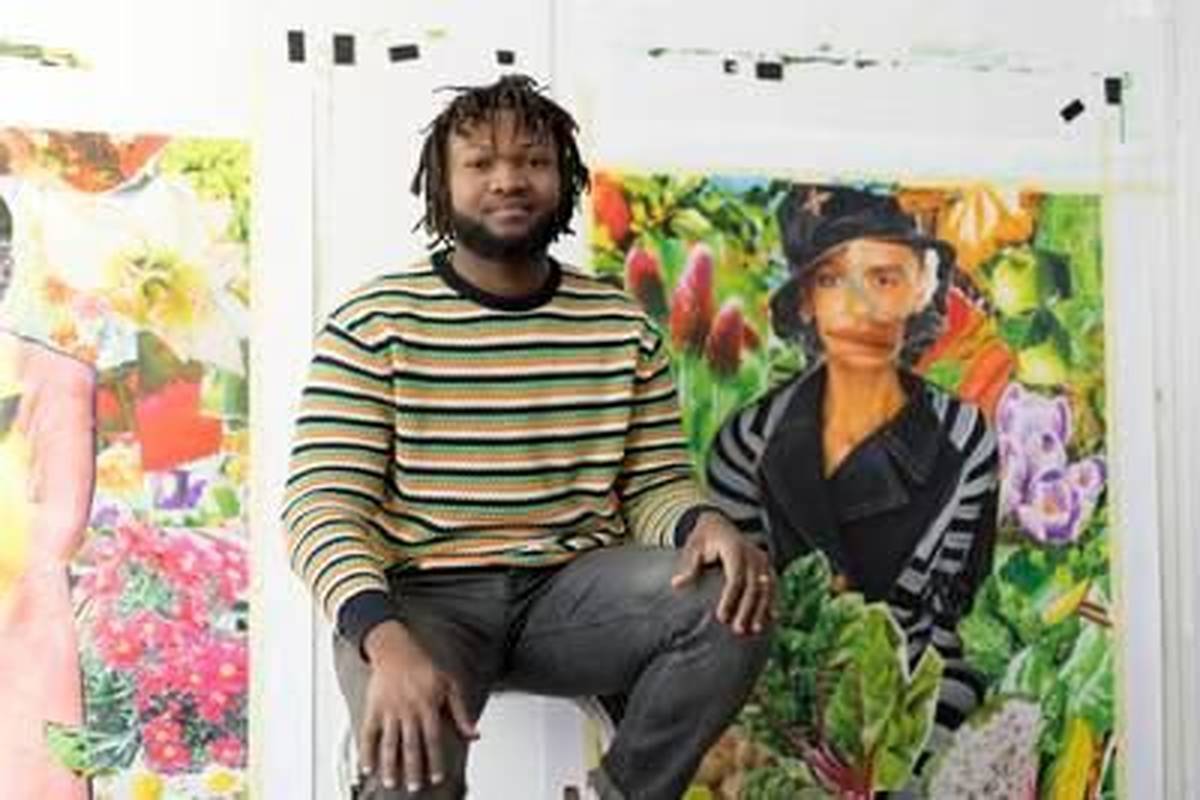
The Soil From Which We Came, focus On Contemporary Black Culture at Lawrie Shabibi Art Gallery Dubai
solo exhibition of Larry Amponsah is on at Lawrie Shabibi Art gallery Dubai the marketplaces of Accra, with their clashes of colours and symphonic bustle, serve as potent inspiration to Larry Amponsah’s paintings — less in terms of subject matter, perhaps, than his overall collage-like approach to the art form, which has him splicing figures from old fashion magazines as well as from the barbershops of London. The Ghanaian artist is marking his first UAE solo show at Lawrie Shabibi gallery. The exhibition, The Soil From Which We Came, is running until February 17, and features large-scale paintings brimming with mixed imagery that are collated like collages. The works focus on contemporary black culture and identity with an awareness of global interconnectivity.
Artdayme:written by: Razming bedirian /art& design website/ Collages of brambles, flowers in bloom and vegetables form backdrops to people modelled with features seemingly ripped from advertisements and other media. From a distance, the works seem to be just that — scraps of overlaid images from fashion magazines.

As viewers draw closer, however, Amponsah’s technical prowess as a painter shines. His process revolves around meticulously arranging the compositions from smaller collages, before digitally manipulating them, enlarging them and painting them on canvas.
Amponsah earned degrees in painting from the Royal College of Art in London, Jiangsu University in China and the Kwame Nkrumah University of Science and Technology in Ghana. He has since been shortlisted for the 2019 Dentons Art Prize, and won the Be Smart About Art Award that same year. He is also currently a Trustee of The the Kuenyehia Art Trust for Contemporary Art in Ghana.
“Collages came naturally to me,” he tells The National. “I grew up in Ghana, which has the most beautiful market scene. My grandmother had a shop there and I would spend a lot of time with her. She sold children’s clothing, elaborate ones worn for Christmas and other holidays."
Amponsah didn’t really consider the impact Accra’s market scene had on him until he became an artist.
“I was able to sort of contextualise that [market] space and the kinds of things that were happening there, and borrow those ideas for my practice,” he says.
“Marketplaces are like collages. There are hundreds of cars going to different places. Even the layers of sound, everyone’s shouting and calling out. Also, the colour clashes. People are sharing spaces, bumping into each other as they go about their daily business, negotiating and just trying to survive. It’s all about the things we do just to be able to find greener pastures.”
The lushness of these envisioned places makes its way to Amponsah’s canvas through a medley of greenery. Radiant blossoms, berries and produce are arranged in jagged forms. Purples, yellows, pinks, oranges and reds diced and assembled in a way that is visually compelling, yet aims to break the tenets of traditional painting.
“When I was doing my masters [in the Royal College of Art], I was interested in pushing my practice to a point where I could be proud of it,” Amponsah says.
“I wanted to see my practice create a space in the history of painting, which required me to go on a journey of experiments and excavations. I experimented with collage in lots of forms.
“As a trained painter, you miss a lot,” he continues.
“There are these set rules in terms of the ways in which colours should be applied. There are complementary colours, analogous colours and those that don’t sit with each other. In the marketplace, it’s different, and that’s what was interesting to me as well."

Then there are the models in Amponsah’s canvases. The larger paintings are among the most recent of his works and came as a result of the Covid-19 pandemic. Various movements in art history were spurred as a result of crisis, the artist says, and for him, it provided the chance to shift his practice.
The Soil From Which We Came is on display at Lawrie Shabibi gallery until February 17

LEAVE A RELPY